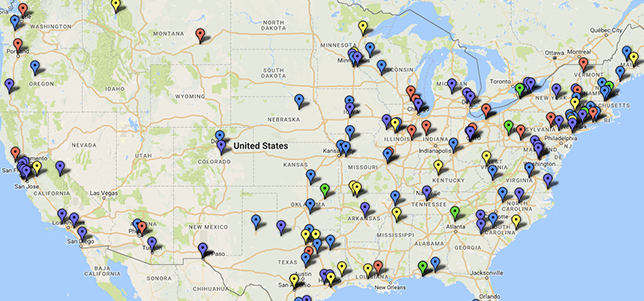K–12 Cyber Incidents Have Been Increasing in 2017
The creator of a national K–12 Cyber Incident Map warns that schools should act now, not later, to bolster their security.

Ed Tech Strategies' K–12 Cyber Incident Map. Courtesy of Doug Levin.
The founder and operator of a K–12 Cyber Incident Map is sharing some lessons he has learned after collecting data over the past 17 months on cyber incidents at United States schools.
Doug Levin, president of Ed Tech Strategies, a Virginia-based research and counsel consultancy, says that as K–12 schools increase their use and reliance on digital tools and services, the number of cyber incidents has also been on the rise — exponentially so.
Since Jan. 1, 2016, 141 U.S. K–12 schools and districts experienced one or more publicly disclosed cyber incidents. Sixty-seven incidents were reported during 2016, and 74 have been reported during the first five months of 2017. If the pace continues at the current rate, that will represent a more than 100 percent increase in 2017, compared to last year.
“Incidents and disruptions have been on the rise,” Levin said in an interview. “We have had more incidents in 2017 than all of 2016. We’ve seen more than double the number of incidents in schools.”
Levin attributed this rise to a few different factors: more awareness of nefarious cyber activities; more schools using more hackable technologies; more schools going 1-to-1 and relying on digital tools; and bad actors who continue to look for soft targets, such as students and school staff.
“They’re looking for vulnerable targets,” Levin said. “My sense is that as schools increase reliance on technology, [cybercriminals] are finding that schools are softer targets.”
Levin has been tracking the publicly disclosed K–12 incidents on a color-coded K–12 Cyber Incidents Have Been Increasing in 2017 -- THE Journal:
